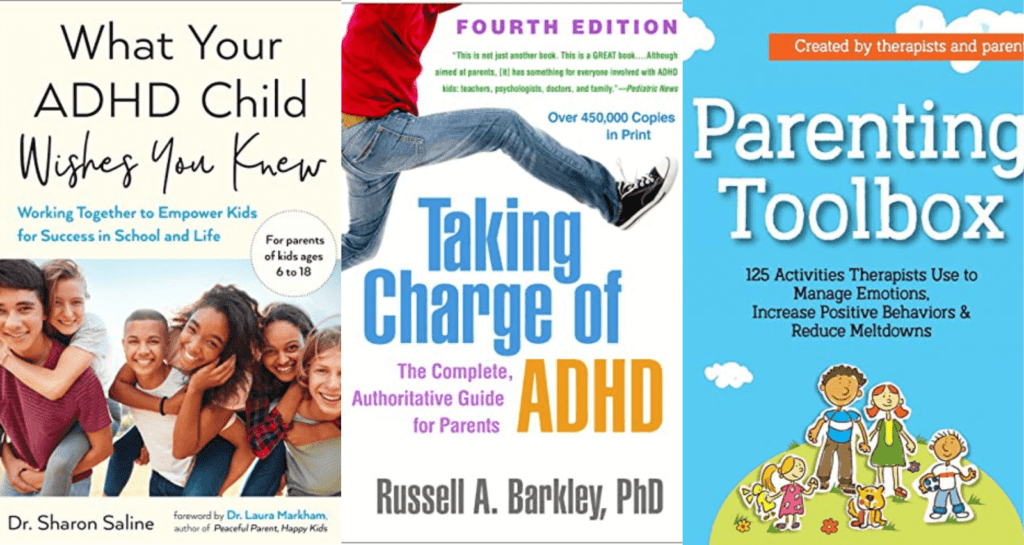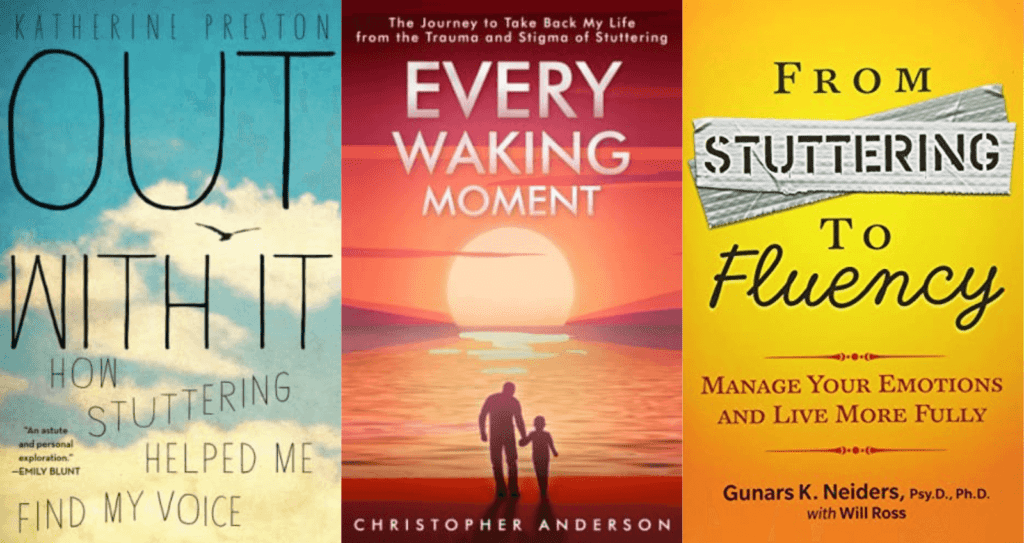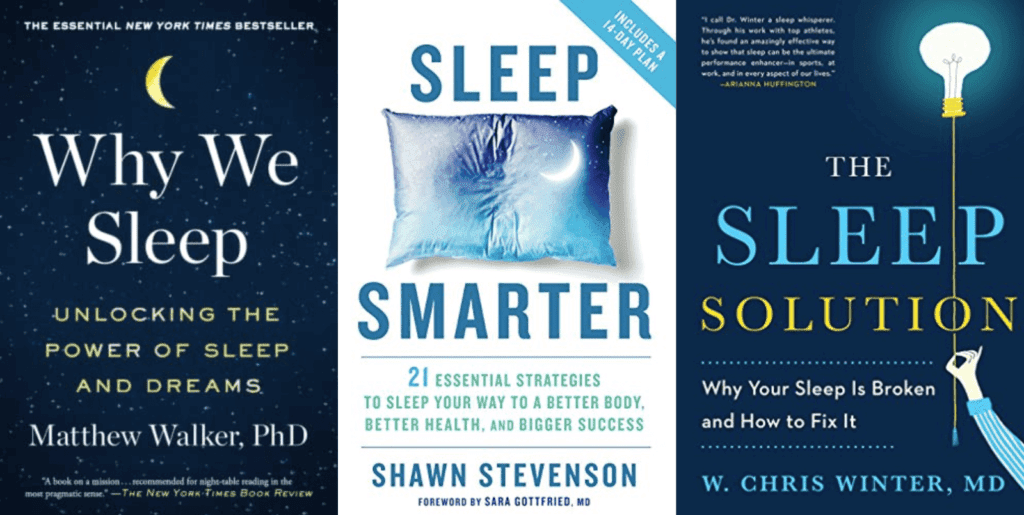The following are some of the best books on ADHD for parents.
Disclosure: Some of the links below are affiliate links. This means that, at zero cost to you, I will earn an affiliate commission if you click through the link and finalize a purchase.
Books On ADHD For Parents

1. What Your ADHD Child Wishes You Knew
By Dr. Sharon Saline
ased on more than 25 years of experience counseling young people and their families, Dr. Saline’s advice and real-world examples reveal how parents can shift the dynamic and truly help kids succeed. Topics include:
* Setting mutual goals that foster cooperation
* Easing academic struggles
* Tackling everyday challenges, from tantrums and backtalk to staying organized, building friendships, and more.
Related: How To Help A Child With ADHD Focus Without Medication? Best 21 ADHD Self-Help Techniques

2. Taking Charge of ADHD
By Russell A. Barkley
Prominent authority Russell A. Barkley compassionately guides you to:
*Understand why kids with ADHD act the way they do.
*Get an accurate diagnosis.
*Work with school and health care professionals to find needed support.
*Implement a proven eight-step behavior management plan.
*Build your child’s academic and social skills.
*Restore harmony at home.
Related: How To Manage Time With ADHD? Best 17 Time Management Tips For ADHD Adults

3. Parenting Toolbox
By Dr. Lisa Phifer, Laura Sibbald, Jennifer Roden
125 Activities Therapists Use to Reduce Meltdowns, Increase Positive Behaviors & Manage Emotions
The Parenting Toolbox is filled with easy-to-use strategies, backed by science, to overcome challenges and strengthen parent-child interaction – one worksheet, activity and exercise at a time.
– Help kids cope with their stressful moments and anxious thoughts
– Improve social skills with siblings, friends and peers at school
– Reduce tantrums and meltdowns to create a more peaceful home
– Diminish the daily fight over screen time
Related: Top +40 Autism Self Help Skills For Adults That Will Make Life Less Stressful (+FREE ASD Resources)

4. The Essential Guide to Raising Complex Kids with ADHD, Anxiety, and More
By Elaine Taylor-Klaus
The Essential Guide to Raising Complex Kids is a wake-up call, a clear path for action, and a message of inspiration, providing a reality-based recipe for raising complex kids, while not making yourself (or your family) crazy in the process.
Parenting expert Elaine Taylor-Klaus of ImpactADHD.com walks you through a proven coach-approach method that provides essential tools for clearly setting effective and realistic expectations for your kids to eliminate daily battles and constant upheaval.
Related: Shy Child Vs. Autism (& How To Parent A Child With Autism?)

5. Mindful Parenting for ADHD
By Mark Bertin MD
Bertin addresses the various symptoms of ADHD using non-technical language and a user-friendly format. In addition, he offers guidelines to help you assess your child’s strengths and weaknesses, create plans for building skills and managing specific challenges, lower stress levels for both yourself and your child, communicate effectively, and cultivate balance and harmony at home and at school.
Related: Best 99 Coping Skills (+FREE Coping Worksheets)

6. Parenting ADHD Now!
By Elaine Taylor-Klaus, Diane Dempster MHSA CPC PCC
In Parenting ADHD Now! Diane and Elaine combine their practical know-how and professional expertise to offer immediate, actionable strategies you can use to guide and support your ADHD child compassionately and effectively.
The material presented in this book is grounded in three main concepts:
- Apply the Coach-Approach to Parenting – This unique method gives you permission to pay attention to yourself, build up your own confidence and self-esteem, and apply these tools when working with your child with ADHD.
- Use Real, Practical Strategies – Learn to effectively navigate the complex terrain of ADHD, confidently minimize ADHD-related stress in your family, and foster your child’s independence.
- Focus on the Parent – This is not about “fixing” your ADHD child. This is about shifting your focus inward and empowering yourself so that you can empower your child as they navigate life with ADHD.
Related: How To Feel Your Feelings? Top 9 Difficult Emotions To Cope With In Healthy Ways

7. Scattered to Focused
By Zac Grisham MS LPC-S ADHD-CCSP
This book is filled with expert advice and actionable strategies that can help your smart but scattered child build the skills they need to thrive both at school and at home.
- Quick assessment tools―Better understand your child’s level of executive function and learn what motivates them, for stronger communication and connection.
- Expert advice―Learn how to build confidence and autonomy in your smart but scattered child with research-based guidance for helping them practice self-control, manage time, follow routines, beat procrastination, and more.
- Common sense explanations―Explore how executive function works in clear, simple language, and then apply what you learned through fun activities like using code words and making memory boards.
Related: Top 39 Self Love Mantras To Practice Daily (+9 Ways To Grow In Self-Love)

8. ADHD: What Every Parent Needs to Know
By American Academy of Pediatrics, Mark L. Wolraich MD FAAP, Joseph F. Hagan Jr MD FAAP
Fully updated with the latest AAP recommendations, this award-winning guide offers parents balanced, reassuring information to help them manage this condition. Topics include: evaluation and diagnosis, coexisting conditions, behavior therapy, ADHD and academics, the role of medication, and complementary and alternative treatments. Parents will also find inspirational and relatable stories from other caretakers.
Related: Are You Addicted To Your Phone Quiz (+Digital Detox Challenge)

9. A Beginner’s Guide on Parenting Children with ADHD
By Richard Bass
In A Beginner’s Guide on Parenting Children with ADHD, you’ll discover:
- How to know if your child has ADHD – and a guide on getting the proper medical attention to avoid misdiagnosis
- The silver lining to ADHD – learn the strengths that come with ADHD and how to help your child harness them
- Aggression and anger outburst coaching guide for kids with ADHD to prevent uncomfortable moments in public
- How to get your teen to listen to you more, follow household rules, and do chores without supervision
- Steps to helping your child manage their ‘big feelings’ and deal with emotions positively
- Medications and alternative treatment options for kids with ADHD
- How to teach your little one compassion and social skills so that they can interact better with their peers and avoid getting isolated
- How to foster consistency in your child’s schoolwork and homework to ensure they do well academically
- Simple tactics and lifestyle changes you can implement at home to help improve your child’s ADHD behavior for good
And much more…
How Books On ADHD For Parents Can Help
Books on ADHD for parents can be incredibly helpful in several ways:
1. Understanding ADHD: These books provide valuable information and insights into what ADHD is, how it affects children, and what the common symptoms and challenges are. By gaining a better understanding of ADHD, parents can feel more equipped to support their child effectively.
2. Practical Strategies: Many books offer practical strategies and techniques that parents can use to help manage their child’s ADHD symptoms. They may provide tips on improving focus, managing impulsivity, developing organization skills, or dealing with hyperactivity. These strategies can be implemented at home and also shared with teachers and other caregivers.
3. Parenting Techniques: Parenting a child with ADHD can be challenging, and books often offer guidance on effective parenting techniques specifically tailored to ADHD. They may provide advice on discipline, setting clear expectations, establishing routines, and fostering positive communication and relationships.
4. Coping and Emotional Support: Raising a child with ADHD can be emotionally demanding for parents. Books on this topic often address the emotional impact of having a child with ADHD and offer coping strategies for managing stress, frustration, and feelings of guilt or inadequacy. They may also provide guidance on building resilience and promoting self-care.
5. Navigating the Education System: Books on ADHD frequently provide information on navigating the education system, including working with schools, advocating for appropriate accommodations, and collaborating with educators to ensure the best possible educational experience for the child.
Conclusion
Books on ADHD for parents can be an invaluable resource, providing knowledge, tools, and support to help parents understand and effectively support their child with ADHD.



